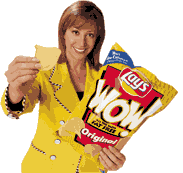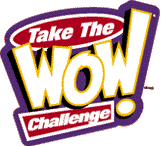 WOW CHIPS
WOW CHIPS 
Should You Just Eat One?
MEDIA LITERACY ACTIVITY #1
BY
Stephanie Lightfoot and Jamie Dalrymple
 WOW CHIPS
WOW CHIPS 
Should You Just Eat One?
MEDIA LITERACY ACTIVITY #1
BY
Stephanie Lightfoot and Jamie Dalrymple
Introduction
Thank you for visiting our web site. Our names are Jamie Dalrymple
and Stephanie Lightfoot. We are elementary education majors at Appalachian
State University. We are in our last year and are trying to put together
as many lesson plans possible that will useful in our classrooms.
This web page is a health lesson plan on the various potato chips.
We chose to do this because students consume a great amount of potato chips
all of the time. This includes a lesson on how to analyze what is in
the media. This is another reason why we chose potato chips.
There are also a lot of commercials, advertisements, and web pages that
consist of information about potato chips. This is helpful for the students
to do their research We also feel that it is important for the students
to begin to learn to read the commercials and decide on whether or not
they are factual.
Audience
Our audience will
be Fifth and Sixth Graders, between the ages of 10-13. We assume
that the learners will be television watchers and through this activity
they will be able to take see how to take apart a television advertisment
to find truths.
Objectives
A. Objectives from the Healthy Living Curriculum.
Fifth
Grade:
5.3) Selecting reliable sources of food and diet information
Sixth Grade:
5.1) Identifying food groups and recommended servings from the food guide
pyramid
5.2) Analyzing the relationships among diet, exercise, and body weight
5.3) Selecting foods high in vitamin A, iron, and vitamin C
B. Objectives from the Information Skills Curriculum
1.2) Identifying computers as tools for accessing current information
2.2) The learner will engage in a research process to meet informational
needs
Activity
1. Show students
various ads on potato chips.
2. Discuss with the
students what they saw, what they thought about the commercials, and how
truthful they found
the commercials.
3. Ask students various
questions about potato chips
1. What types of chips do you like and why?
2. What types of chips (if any) are usually in your household and why?
3. Do you think Wow potato chips and baked potato
chips are really that much better to eat and why?
4. Do you know what Olean is and what it is made of?
4. Have the students
do research to see what they are able to find out about the various kinds
of potato
chips?
5. Regroup with the
students after they have found the research and discuss what they have
found.
6. Have the students
create a "truthful" advertisement for a magazine or newspaper, about their
favorite
potato chips using the research they have found.
Media Literacy Key Concepts
1. All media are constructions. Media products are carefully crafted constructions, the results of many decisions, conscious and unconscious.
2. The media are commercial entities. All media products are shaped, in terms of both their form and their content, by commercial considerations.
3. Media communicate values and ideology. All media products contain implicit and explicit value messages and assumed truths about the nature of human beings and the world in which we live.
4. The media have social and political implications. The mass media have the potential to affect out behavior as individuals and citizens in a variety of ways.
5. Media forms are related to content. Different media represent reality in different ways: the form of a given piece of media shapes the message it sends.
6. The media have aesthetic qualities. Familiarity with the aesthetic dimensions of media can lead to deeper understanding and greater enjoyments.
7. Audiences are involved in the process of creating meaning. What a viewer makes of a piece of media depends on his or her past experiences, viewing skill, and current state of mind.
Reflection
Reflection will go here
Links
http://www. medialit.org
Center for Media Literacy
This is a web page designed for teachers.
http://kidsnet.org
KIDSNET
media information for young kids to look up
http://tufts.edu/~rfaust/
Rob's Project for Media Awareness
http://interact.uoregon.edu/MediaLit/HomePage
The Media Literacy Online Projects
E-MAIL US!
[email protected] or [email protected]